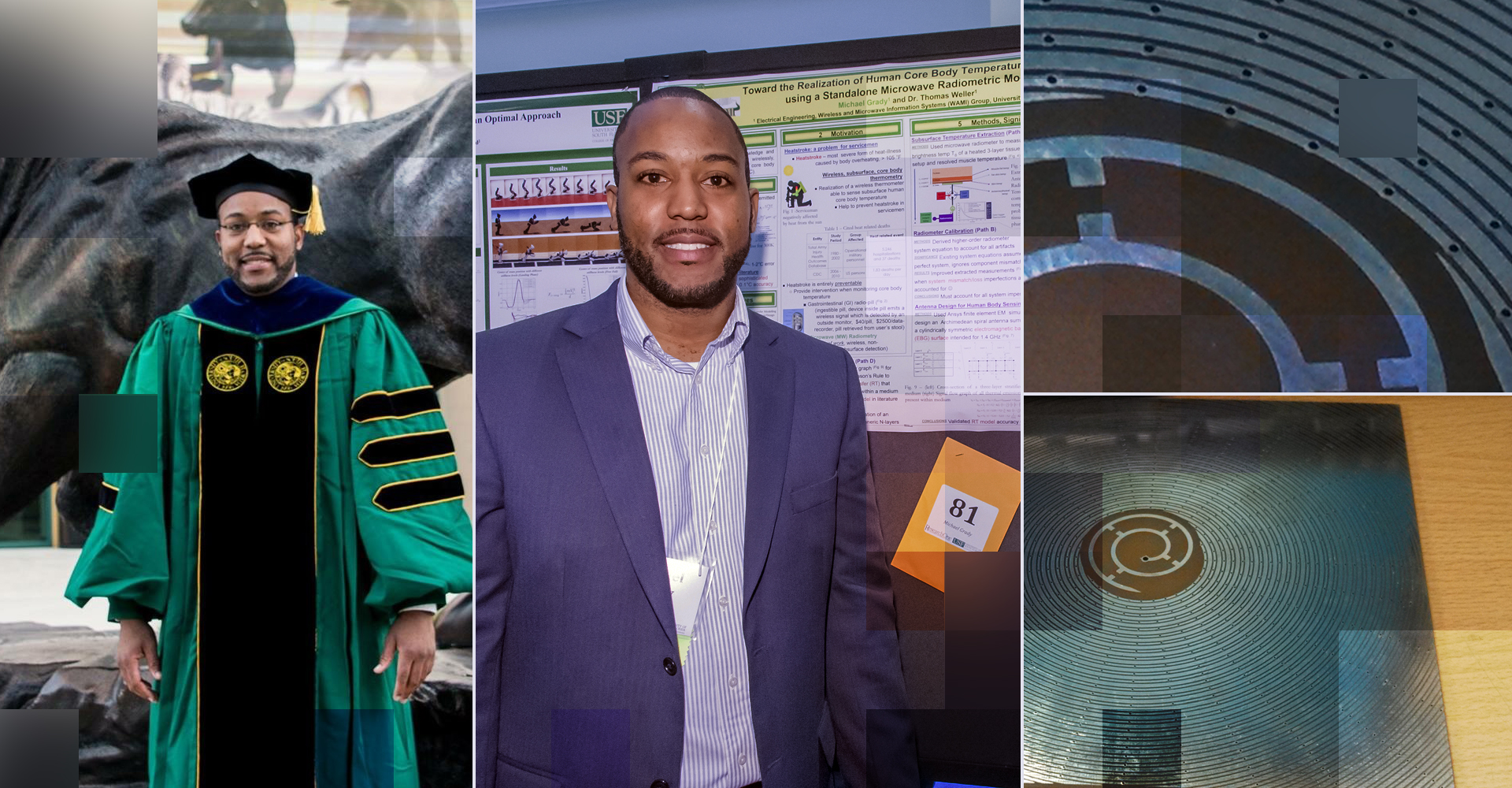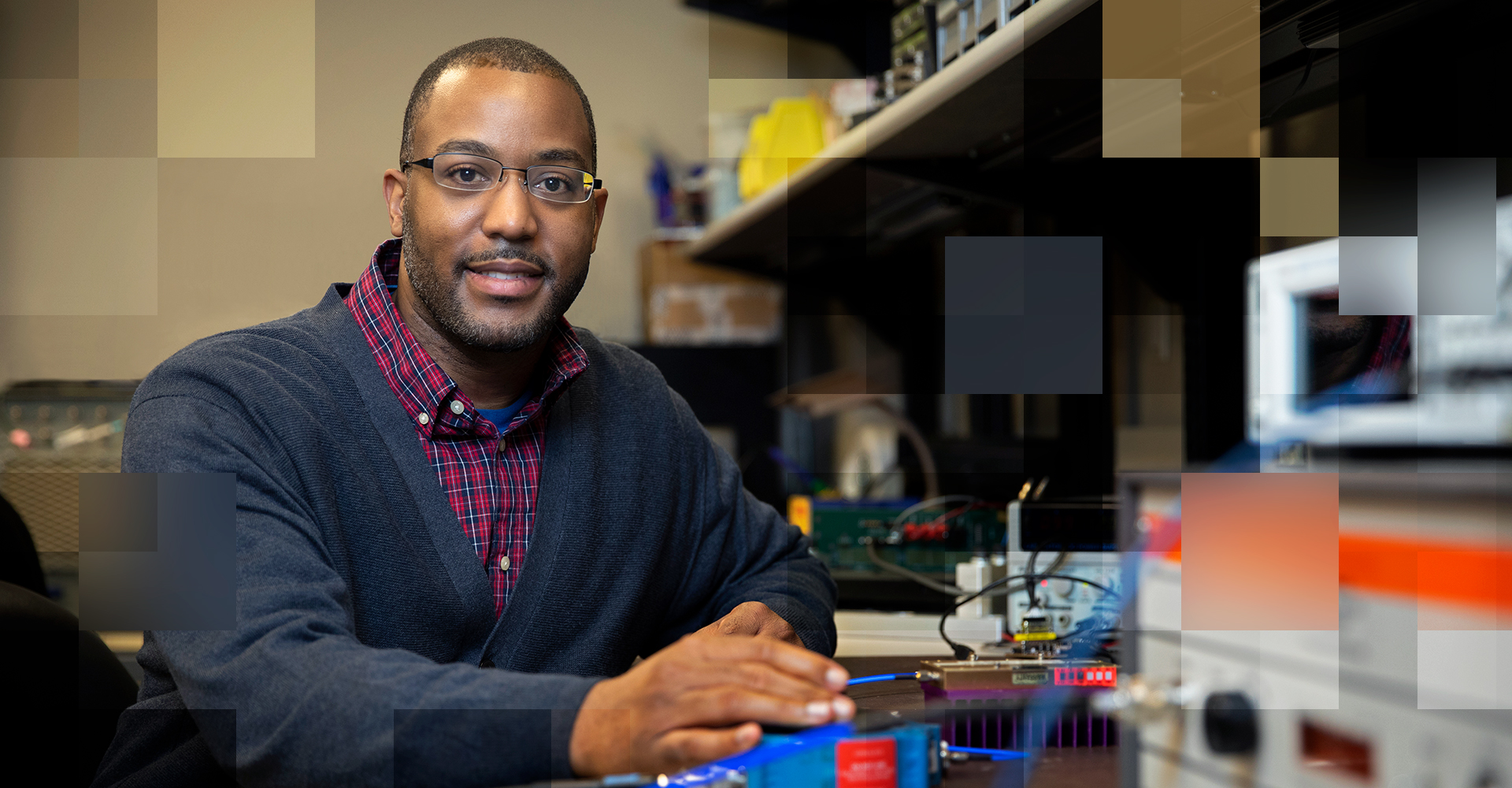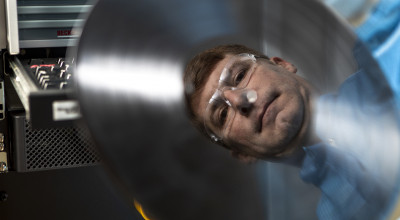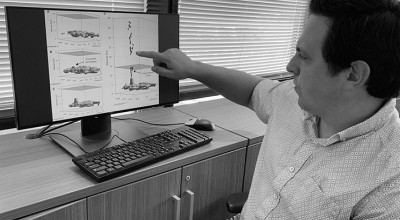Like many students preparing to graduate, Michael Grady, an electrical engineering doctoral student at the University of South Florida (USF), had a list of companies he wanted to work for one day. Little did he know about the opportunities that awaited him at GTRI.
Four years later, and now a patent holder, Michael Grady, Ph.D., finds himself at the Georgia Tech Research Institute (GTRI), innovating creative solutions to complex problems. In the Electro-Optical Systems Laboratory (EOSL), Grady’s specialty is in the field of radio frequency (RF), microwave, and antenna engineering, where he primarily focuses on the design of antennas and electronic circuits for projects ranging from RF countermeasures and decoys to wideband transmit and receive (T/R) modules.
Like many GTRI innovators, Grady enjoys discovering answers to open-ended questions. Our researchers combine science, engineering, economics, policy, and technical expertise to address challenges facing government, state, and industry.
Grady is also a big advocate for inclusivity in the science, technology, engineering, and mathematics (STEM) fields, a passion he shares with many GTRI colleagues.

Michael Grady in his GTRI lab, where he works with a measuring horn antenna with a network analyzer. Photo credit: Sean McNeil.
Grady's Impact
Grady’s journey to GTRI began when he met then GTRI researcher Tyrone Roach, Ph.D., at the Academic and Research Leadership Symposium (ARLS), a symposium that is co-located with the National Society of Black Engineers (NSBE) Annual Convention. The ARLS aims to prepare minority engineers whose careers largely focus on research for leadership within their fields. Roach mentioned to Grady that he designed antenna arrays for GTRI. A short time later, Grady met Erick Maxwell, Ph.D., a fellow research engineer and STEM advocate, when Maxwell came to USF to recruit students for GTRI.
Although Grady had a distinctive post-graduation plan, he did not anticipate how it all would change after meeting these GTRI researchers. Maxwell and Grady shared two important things: a love for RF engineering applied to medical applications and a research advisor from the same doctoral program. Maxwell had also referred him to GTRI Senior Research Engineer Chris Ward, who is now Grady’s boss.
GTRI is headquartered in Atlanta, which was only a few hours away from Grady’s family in Alabama. Working in Atlanta would allow him to work with RF and not be too far away from family.
“After meeting Erick at USF — and I eventually noticed four other signs pointing toward the same direction [of GTRI] — I knew that the Georgia Tech Research Institute is where I wanted to be,” Grady said.
Throughout his career, Grady has learned the importance of flexibility, hard work, and giving back to his industry. He now serves on the steering committee for the Institute of Electrical and Electronics Engineers (IEEE) Wireless and Microwave Technology Conference (WAMICON), a conference that helped propel his Ph.D. journey at USF. He is also a co-project director with GTRI Chief Scientist Thomas Martin, Ph.D., for a US Army workforce development contract that is designed to form a long-term strategic partnership with Historically Black Colleges and Universities (HBCUs) and Minority Serving Institutions (MSIs), and to accelerate the availability of a diverse workforce from these qualified research institutions. This research collaboration will leverage GTRI’s University Affiliated Research Center (UARC) Core Competencies to maintain and expand the skills of its existing workforce.
Grady also recruits for GTRI and serves in various professional organizations hoping to pave the way for others to reach their goals. He serves on the advisory board for the Greater Alabama Black Belt Region Louis Stokes Alliance for Minority Participation (GABBR LSAMP) program, a program designed to increase college readiness among students from the Black Belt Region of Alabama. He is an avid recruiter at the National GEM Consortium Annual Conference, the National Society of Black Engineers’ Annual Convention, the Black Engineer of the Year Awards (BEYA) STEM Conference, Morehouse College, Auburn University, and USF.

Left to right: Michael Grady's graduation photo from USF. Photo credit: Angelina Grande Photography; Grady with a poster about his patent. Photo credit: Gil Williams Photography; Grady's patented device called the On-Body, Inward-Facing Antenna. Photo credit: Michael Grady.
Overcoming Obstacles
Having grown up in a low-income, minority community in Birmingham, Alabama, Grady understands both the struggles that marginalized youth face and the pitfalls that may stand in their way of greatness. His parents strongly encouraged him to work hard and never take for granted the opportunities that were in front of him, embedding within him the determination that contributed to his current success.
During his undergraduate studies at Auburn University, Grady recalls struggling in physics and having to work much longer than his more prepared peers in order to achieve the same results.
“After I took that first test in undergrad physics, I got a rude awakening that I was not as prepared as I needed to be,” Grady said. “Luckily, one of the most important lessons that I learned from growing up in an environment that inherently breeds struggle is that failure is a part of success, and it is absolutely necessary in order to define your character, to help you reach your potential, and to learn what the failure is meant to teach you.”
Grady enrolled in tutoring programs and leaned on a study group that included some of his more prepared peers, some of whom went to graduate school with him. His hard work paid off.
“I am proud to say that through my hard work, determination, a strong support network, and sometimes a few lucky breaks, I maintained the good grades that I had worked so hard for up until that point,” Grady said.
Pursuing Innovation
While pursuing his Ph.D., Grady began working to solve a problem that would lead to obtaining the patent, US 10581173, for on-body, inward-facing antennas. He finally received the patent in 2020.
Grady designed these wireless thermometer devices to detect internal body temperature without the electromagnetic signals receiving interference from the wearer’s skin. The sensors could help prevent people, such as athletes or military trainees, from suffering hyperthermia simply by being able to monitor their core body temperature and provide an intervention whenever necessary.
“With great power comes great responsibility, so applying a skill set that I am strong in — the design of antennas and electronic circuits — to solve the world’s problems (whether sports, medical, or environmental related) is my duty,” Grady said.
Grady has been assisting in the response to the Covid-19 pandemic as well. GTRI has taken on numerous projects that include designing essential personal protective equipment (PPE), innovating ways to disinfect PPE for reuse, and creating a low-cost ventilator, among other initiatives.
Congruent with those efforts, Grady is currently co-leading a team at GTRI to develop a wireless device that could combat the spread of the coronavirus. The device neutralizes a virus contained within an airborne droplet by exposing it to human-safe RF energy, which breaks the virus’ outer structure and disables it from attaching to our cells’ receptors. receptors
“Covid-19 has affected everyone, including my friends and family, and we have the skillset to make an impact,” Grady said.

Michael Grady in his GTRI lab. Photo credit: Sean McNeil.
Pursuing Mentorship
Grady emphasizes the importance of giving and receiving help. He credits his successes to several mentors in his life — many of whom he found through professional organizations, schools, and the universities he’s attended. These include family, academic advisors, teachers, professors, and colleagues at work and at the various professional organizations he participates in.
Grady also admires many inventors who have gone before him, and during Black History Month, he reflects on Black inventors who have paved the way.
One of those inventors is Dennis Weatherby, Ph.D., who held a patent for what is now called lemon-scented Cascade. He was also the founding director of Auburn University’s Minority Engineering Program (MEP).
“Dr. Weatherby gave me a scholarship out of high school to join (the) MEP program at Auburn,” Grady said. “I am forever grateful for his insightful talks and his strong belief that I would continue to succeed and make him proud. I saw a great example of a positive Black male role model whose reach far extended his grasp. I strive to touch lives in that same spirit.”
Now, Grady helps other students by advocating for inclusion in STEM, speaking in front of aspiring engineers, and providing advice and mentorship for those seeking to start their careers. He is an example that dreams can be achieved no matter your circumstances.

RELATED LINK:
STEM@GTRI
STEM@GTRI is the Georgia Tech Research Institute’s K12 outreach program. Funded by the State of Georgia, the mission of STEM@GTRI is to inspire, engage, and impact Georgia educators and students by providing access to experts in the fields of science, technology, engineering, and math (STEM).





